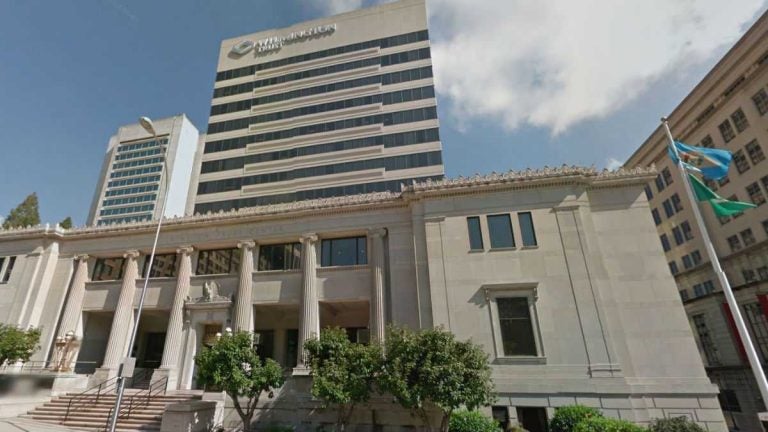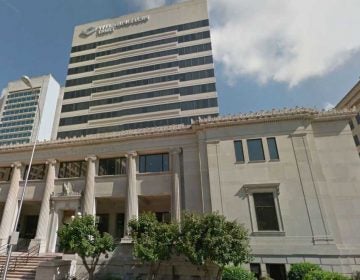2 more former Wilmington Trust officers get prison time for ‘tangled web’ of crimes
Six former officials of the former Wilmington Trust bank, including former CEO Robert Harra, are now headed to prison for financial crimes.

Six former officers of Wilmington Trust have been sentenced to prison for financial crimes. (image via Google Maps)
Two more former officers of Wilmington Trust were sentenced to prison Thursday – one for concealing the failing institution’s financial condition and an illegal loan scheme with a competing banker, the other for accepting a loan from a developer who borrowed from the bank.
Thursday’s federal court sentencings in Wilmington raise the number of ex-Wilmington Trust officers bound for prison to six.
Brian Bailey, 56, who oversaw all commercial banking for Delaware clients, was sentenced to two and a half years in federal prison and was fined $15,000.
Bailey had pleaded guilty in 2014 for his role in hiding millions of dollars in bad loans from the Federal Reserve, the Securities and Exchange Commission and the public between October 2009 and November 2010. Prosecutors said he and other defendants schemed to hide the true volume of past-due loans on a “second set of books” and were well aware the practice was illegal. Many of the loans had been made to support the coastal Sussex County development boom that later collapsed from the 2008 housing market crash.
Bailey also pleaded guilty to accepting large personal loans at favorable rates from an executive of another bank while giving that banker similar personal loans over more than a decade. James Ladio, former president of Midcoast Community Bank, got 24 months in prison for his role in that conspiracy.
Former loan officer Peter W. Hayes, 53, will spend 15 months in federal prison for soliciting and accepting a $70,000 loan from a customer, home builder Steve Anderson, to buy two of his model homes. Anderson later loaned Hayes money to pay off the mortgages on the homes after they lost value, and he sold them for less than what he paid. Like Bailey, Hayes pleaded guilty in 2014.
The others who got prison time after being convicted at trial last year include president Robert Harra and chief financial officer David Gibson, who both got six years behind bars and $300,000 fines. Chief credit officer William North, who got four and a half years and a $100,000 fine, and controller Kevyn Rakowski, sentenced to three years, were convicted at trial last year.
Former commercial loan executive Joseph Terranova, who pleaded guilty in 2013 to defrauding the bank and shareholders and testified against his former colleagues during the trial, will be sentenced Tuesday.
The bank was sold in November 2010 to Buffalo, N.Y.-based M&T Bank at a fire sale price. Wilmington Trust’s former investment arm and wealth advisory division is now an M&T subsidiary under the Wilmington Trust banner, but all the former consumer branches now carry the name M&T Bank.
Founded in 1903 by the president of the DuPont Co., to manage the family’s growing wealth, Wilmington Trust is the only U.S. financial institution that received money from the 2009 federal bank bailout program to be charged criminally. Last year the bank reached a $60 million settlement with prosecutors and agreed to pay $200 million to settle a shareholder lawsuit.
Latest sentences below U.S. guidelines
The federal sentencing guidelines for Bailey called for a sentence of 33 to 41 months behind bars.
But Bailey, along with his wife, stepdaughter and attorney John Deckers, argued for home confinement. They told U.S. District Court Judge Richard G. Andrews of his various goods deeds, such as caring for his stepdaughter’s paraplegic husband, then raising her son after her husband died.
Cheryl Bailey, who also worked at Wilmington Trust in a managerial role, said her husband was influenced by the bank’s aggressive search for 10 percent profit growth annually. She said meetings usually ended with the exhortation, “Go forth and sell.”
But prosecutor Lesley Wolf said he was at “ground zero” of the conspiracy and noted that his crooked deal with Ladio went on for more than a decade. She also sought a $100,000 fine and added that his role was central to the “tangled web of the events” that ultimately brought down Wilmington Trust and cost 700 employees their jobs.
Andrews agreed the crimes were serious but said Bailey had many “admirable” qualities and that his ability to be successful in a post-banking career with an unidentified company was “impressive.”
So he departed downward from the guidelines in giving Bailey two and a half years behind bars.
At Hayes’ sentencing, defense attorney Eugene J. Maurer Jr. asked Andrews for leniency, arguing that his client was influenced by the bank’s corrupt culture but has come to understand the criminal nature of his actions.
“This is really sad that he’s here because he’s a really good man,’’ Maurer told Andrews, calling his client “a crushed man” who had allowed “his judgment to become clouded.”
Hayes, a popular youth soccer coach and administrator in the Hockessin area, expressed remorse.
“I chose, much like a lemming, to follow the crowd over the cliff,’’ Hayes told the judge, adding that he “had every opportunity to say no,’’ but chose to engage in the illegal financial relationship with a client.
Federal prosecutor Robert Kravetz sought 18 to 24 months behind bars, the guideline for Hayes’ crime. Hayes “violated the standard rules of banking having a relationship with a client for personal gain.”
While prosecutors didn’t tie Hayes’ actions to the bank’s collapse, Andrews pointed out that he violated what is “generally known as the bank bribery statute.”
Andrews gave Hayes credit for cooperating with authorities and his youth soccer work, but pointed out that he received a “good salary” at Wilmington Trust but chose to engage in criminal activity to augment his income.
By the end of 2009, the bank reported only $10.9 million in bad loans, while waiving more than $360 million, prosecutors said. The bank also raised $287 million in investments without disclosing its financial problems to investors.
When the defendants knew they could no longer hide the practice, prosecutors said, they created a “mass extension process” of temporarily extending loans on a short-term basis.
In under two months, the bank allegedly extended about 800 loans worth more than $1.3 billion. Prosecutors said some borrowers didn’t know their loans had been extended.
David Weiss, U.S. attorney for Delaware, was in the courtroom Thursday but would not comment. But he previously said the sentences given to other defendants send “a clear message that top corporate bankers cannot lie to their regulators and the public about important disclosures that affect the safety and soundness of banks and impact the decision of investors to buy or sell stock.
“The defendants’ actions contributed to the downfall of an important Delaware institution, causing hundreds of employees to lose their jobs and investors to lose hundreds of millions of dollars when the bank’s stock price collapsed,” he said. “The sentences imposed by the court appropriately punish the defendants for their serious criminal conduct and strongly encourage other corporate executives to follow the law.”
WHYY is your source for fact-based, in-depth journalism and information. As a nonprofit organization, we rely on financial support from readers like you. Please give today.




